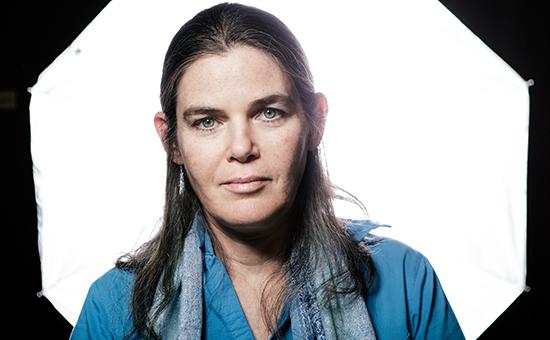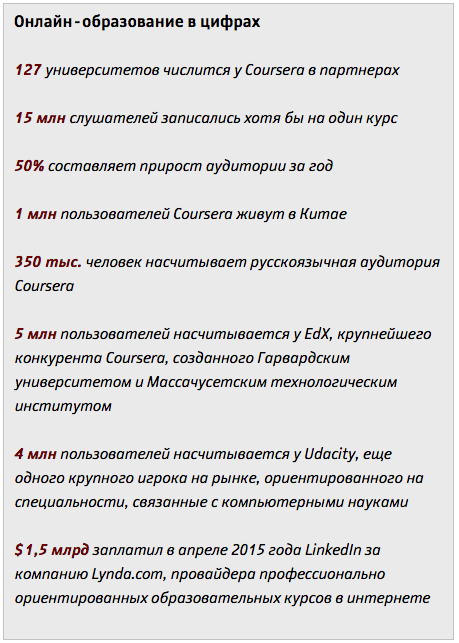Coursera president talks about trainees, monetization and the online education market
Coursera, one of the leaders in the online education market, has been operating since 2012. Now the site’s audience - more than fifteen million people, of which three hundred thousand live in Russia, and three hundred and fifty thousand - attend Russian-language courses from the Higher School of Economics, Moscow Institute of Physics and Technology, St. Petersburg State University and other Russian universities. The company has more than a hundred partners among higher education institutions around the world, and employers already take into account the online education of applicants. Coursera
monetization is based on the payment of diplomas, and the passage of most courses is free. The business model allowed the company to attract one hundred and thirty-five million investments from venture capital funds.
Coursera President Daphne Koller spoke about a new market for online courses that can reach a billion people.

Photo: Anton Berkasov for RBC
On average, 85% of Coursera students are adults. They need updated and up-to-date information. Not everyone has the opportunity to return to a regular university after forty years, and online courses allow them to gain knowledge to carry out their work duties. In China there are more young people who use courses to supplement the university program, and in Russia there are more professionals.
More than half of users take courses to advance on the career ladder. A quarter of users are studying or preparing to go to college, while the rest want to expand their horizons. Coursera receives the main proceeds from the purchase of certificates by professionals. Universities take half of the proceeds, but the main thing for universities is to increase recognition, although popular courses can significantly supplement the faculty budget.
Among Coursera users, there are people who have attended from one hundred to one hundred and fifty courses, which is the full equivalent of a university computer science course.
Daphne Koller told RBC what market the company expects. Each year, up to four hundred and fifty million people graduate, and each of them could be a student of online courses. If we add to this number of people who are not able to get an education, then the potential audience is up to a billion people.
Coursera studies market trends, conducts market research on professional competencies, analyzes search data on its own website, collects data from job sites and determines which skills are most often mentioned and which skills are rare - if vacancies remain unfilled for a long time. The company is asking one hundred and twenty-seven universities to deliver such courses, and partners are moving forward, says Daphne Koller. The company does not cooperate with employers.
When asked whether there are any completely unpopular courses, Daphne replied that even the strangest courses find an audience of several thousand people. The site had a course on Galois theory in French and a course on nanotechnology in Arabic, which was taught by a professor from an Israeli university.
Many organizations in the online education market are non-profit organizations. Coursera immediately went on a commercial path: "a responsive system must produce enough value so that people are willing to pay." The company is still unprofitable, but hopes to profit in the coming years thanks to specializations that people are willing to pay for and growth in international markets. Daphne Koller sees public placement as the only exit strategy.
Investors, including Kleiner Perkins Caufield & Byers and New Enterprise Associates, do not put pressure on the company. Coursra’s audience has grown 1.5 times over nine months, while revenue growth has outpaced the number of users.

Online education in numbers. RBC
monetization is based on the payment of diplomas, and the passage of most courses is free. The business model allowed the company to attract one hundred and thirty-five million investments from venture capital funds.
Coursera President Daphne Koller spoke about a new market for online courses that can reach a billion people.

Photo: Anton Berkasov for RBC
Listeners and monetization
On average, 85% of Coursera students are adults. They need updated and up-to-date information. Not everyone has the opportunity to return to a regular university after forty years, and online courses allow them to gain knowledge to carry out their work duties. In China there are more young people who use courses to supplement the university program, and in Russia there are more professionals.
More than half of users take courses to advance on the career ladder. A quarter of users are studying or preparing to go to college, while the rest want to expand their horizons. Coursera receives the main proceeds from the purchase of certificates by professionals. Universities take half of the proceeds, but the main thing for universities is to increase recognition, although popular courses can significantly supplement the faculty budget.
Among Coursera users, there are people who have attended from one hundred to one hundred and fifty courses, which is the full equivalent of a university computer science course.
Daphne Koller told RBC what market the company expects. Each year, up to four hundred and fifty million people graduate, and each of them could be a student of online courses. If we add to this number of people who are not able to get an education, then the potential audience is up to a billion people.
Course Topics
Coursera studies market trends, conducts market research on professional competencies, analyzes search data on its own website, collects data from job sites and determines which skills are most often mentioned and which skills are rare - if vacancies remain unfilled for a long time. The company is asking one hundred and twenty-seven universities to deliver such courses, and partners are moving forward, says Daphne Koller. The company does not cooperate with employers.
When asked whether there are any completely unpopular courses, Daphne replied that even the strangest courses find an audience of several thousand people. The site had a course on Galois theory in French and a course on nanotechnology in Arabic, which was taught by a professor from an Israeli university.
Investments
Many organizations in the online education market are non-profit organizations. Coursera immediately went on a commercial path: "a responsive system must produce enough value so that people are willing to pay." The company is still unprofitable, but hopes to profit in the coming years thanks to specializations that people are willing to pay for and growth in international markets. Daphne Koller sees public placement as the only exit strategy.
Investors, including Kleiner Perkins Caufield & Byers and New Enterprise Associates, do not put pressure on the company. Coursra’s audience has grown 1.5 times over nine months, while revenue growth has outpaced the number of users.

Online education in numbers. RBC
